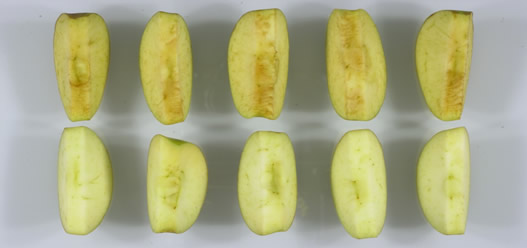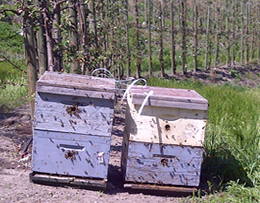That's not how the saying goes but we may soon be changing our tune. Apples have already been given a bad rap due to the waxes and pesticides used in the growing process but now a new discovery rears its ugly head in the form of genetically modified Arctic apples. Arctic Apples are a specialty brand of apples that contain a new trait spearheaded by Okanagan Specialty Fruits Inc. (OSF), a company founded by Neal Carter in British Columbia's Okanagan Valley. The company uses "genetic engineering and special breeding" techniques to acheive the non-browning capability in the apples. Specifically, gene silencing is used to reduce levels of polyphenol oxidase (PPO) which allows the apple's flesh to retain its original color even when subjected to bruising or slicing.

In February 2015, Arctic apples were approved by the U.S. Department of Agriculture (USDA), becoming the first genetically modified apple approved for sale in the United States. On March 20, 2015 the Canadian Food Inspection Agency (CFIA) and Health Canada completed their assessment and approved the growing of Arctic apples in Canada. In a letter to OSF, the CFIA concluded that Arctic apples "are as safe and nutritious as traditional apple varieties."
Also on March 20, 2015, the U.S. Food and Drug Administration (FDA) completed its evaluation for two varieties of apples genetically engineered by Okanagan Specialty Fruits, Inc and they too concluded that the apples were "not materially different in safety, nutrition, composition, or other relevant characteristics from food and feed from apples currently on the market...".
PROS
- Many persons bypass bruised apples at the grocery store so the belief is that this feature will reduce the amount of apples discarded and save grocery stores thousands of dollars yearly.
- Arctic apples will also be cosmetically appealing to consumers because they won't turn brown when sliced. (A sliced Arctic apple can be refrigerated in a zip-lock bag for several days without any noticeable browning).
- Frozen fruits and vegetable are a huge market and Arctic apples will allow apples to be frozen, bagged and added to the Frozen food aisle as a quick and easy way to add our favourite fruit to meals.
| CONS |

On site bee hive for apple tree pollination |
- How safe are these biotech apples? The USDA and FDA have approved these apples as fit for consumption but in what quantities? What about cross-pollination of these crops with conventional or organic crops?
|
- Uneven playing field. Countries not supporting genetically modified foods will have a tough time competing on the international market if the demand for non-browning apples reaches the expected levels.
|
|

